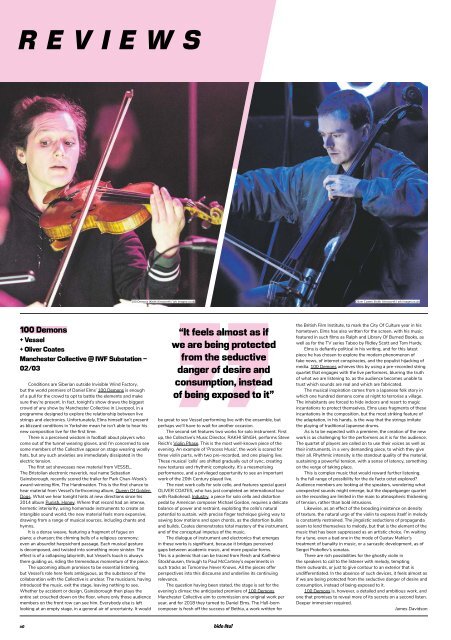Issue 87 / April 2018
April 2018 issue of Bido Lito! magazine. Featuring: FACT AT 15, BEIJA FLO, DAWN RAY'D, BONEFACE, PIZZAGIRL, WILEY, PUBLIC SERVICE BROADCASTING and much more.
April 2018 issue of Bido Lito! magazine. Featuring: FACT AT 15, BEIJA FLO, DAWN RAY'D, BONEFACE, PIZZAGIRL, WILEY, PUBLIC SERVICE BROADCASTING and much more.
You also want an ePaper? Increase the reach of your titles
YUMPU automatically turns print PDFs into web optimized ePapers that Google loves.
REVIEWS<br />
100 Demons (Keith Ainsworth / ark images.co.uk) Oliver Coates (Keith Ainsworth / ark images.co.uk)<br />
100 Demons<br />
+ Vessel<br />
+ Oliver Coates<br />
Manchester Collective @ IWF Substation –<br />
02/03<br />
Conditions are Siberian outside Invisible Wind Factory,<br />
but the world premiere of Daniel Elms’ 100 Demons is enough<br />
of a pull for the crowd to opt to battle the elements and make<br />
sure they’re present. In fact, tonight’s show draws the biggest<br />
crowd of any show by Manchester Collective in Liverpool, in a<br />
programme designed to explore the relationship between live<br />
strings and electronics. Unfortunately, Elms himself isn’t present<br />
as blizzard conditions in Yorkshire mean he isn’t able to hear his<br />
new composition live for the first time.<br />
There is a perceived wisdom in football about players who<br />
come out of the tunnel wearing gloves, and I’m concerned to see<br />
some members of the Collective appear on stage wearing woolly<br />
hats, but any such anxieties are immediately dissipated in the<br />
electric tension.<br />
The first set showcases new material from VESSEL.<br />
The Bristolian electronic maverick, real name Sebastian<br />
Gainsborough, recently scored the trailer for Park Chan-Wook’s<br />
award-winning film, The Handmaiden. This is the first chance to<br />
hear material from Vessel’s forthcoming album, Queen Of Golden<br />
Dogs. What we hear tonight hints at new directions since his<br />
2014 album Punish, Honey. Where that record had an intense,<br />
hermetic interiority, using homemade instruments to create an<br />
intangible sound world, the new material feels more expansive,<br />
drawing from a range of musical sources, including chants and<br />
hymns.<br />
It is a dense weave, featuring a fragment of fugue on<br />
piano; a chanson; the chiming bells of a religious ceremony;<br />
even an absurdist harpsichord passage. Each musical gesture<br />
is decomposed, and twisted into something more sinister. The<br />
effect is of a collapsing labyrinth, but Vessel’s touch is always<br />
there guiding us, riding the tremendous momentum of the piece.<br />
The upcoming album promises to be essential listening,<br />
but Vessel’s role here feels ambiguous, as the substance of the<br />
collaboration with the Collective is unclear. The musicians, having<br />
introduced the music, exit the stage, leaving nothing to see.<br />
Whether by accident or design, Gainsborough then plays the<br />
entire set crouched down on the floor, where only those audience<br />
members on the front row can see him. Everybody else is left<br />
looking at an empty stage, in a general air of uncertainty. It would<br />
“It feels almost as if<br />
we are being protected<br />
from the seductive<br />
danger of desire and<br />
consumption, instead<br />
of being exposed to it”<br />
be great to see Vessel performing live with the ensemble, but<br />
perhaps we’ll have to wait for another occasion.<br />
The second set features two works for solo instrument. First<br />
up, the Collective’s Music Director, RAKHI SINGH, performs Steve<br />
Reich’s Violin Phase. This is the most well-known piece of the<br />
evening. An example of ‘Process Music’, the work is scored for<br />
three violin parts, with two pre-recorded, and one playing live.<br />
These musical ‘cells’ are shifted gradually out of sync, creating<br />
new textures and rhythmic complexity. It’s a mesmerising<br />
performance, and a privileged opportunity to see an important<br />
work of the 20th Century played live.<br />
The next work calls for solo cello, and features special guest<br />
OLIVER COATES, who has just completed an international tour<br />
with Radiohead. Industry, a piece for solo cello and distortion<br />
pedal by American composer Michael Gordon, requires a delicate<br />
balance of power and restraint, exploiting the cello’s natural<br />
potential to sustain, with precise finger technique giving way to<br />
sawing bow motions and open chords, as the distortion builds<br />
and builds. Coates demonstrates total mastery of the instrument,<br />
and of the conceptual impetus of the music.<br />
The dialogue of instrument and electronics that emerges<br />
in these works is significant, because it bridges perceived<br />
gaps between academic music, and more popular forms.<br />
This is a polemic that can be traced from Reich and Karlheinz<br />
Stockhausen, through to Paul McCartney’s experiments in<br />
such tracks as Tomorrow Never Knows. All the pieces offer<br />
perspectives into this discourse and underline its continuing<br />
relevance.<br />
The question having been stated, the stage is set for the<br />
evening’s climax: the anticipated premiere of 100 Demons.<br />
Manchester Collective aim to commission one original work per<br />
year, and for <strong>2018</strong> they turned to Daniel Elms. The Hull-born<br />
composer is fresh off the success of Bethia, a work written for<br />
the British Film Institute, to mark the City Of Culture year in his<br />
hometown. Elms has also written for the screen, with his music<br />
featured in such films as Ralph and Library Of Burned Books, as<br />
well as for the TV series Taboo by Ridley Scott and Tom Hardy.<br />
Elms is defiantly political in his writing, and for this latest<br />
piece he has chosen to explore the modern phenomenon of<br />
fake news, of internet conspiracies, and the populist hijacking of<br />
media. 100 Demons achieves this by using a pre-recorded string<br />
quartet that engages with the live performers, blurring the truth<br />
of what we are listening to, as the audience becomes unable to<br />
trust which sounds are real and which are fabricated.<br />
The musical inspiration comes from a Japanese folk story in<br />
which one hundred demons come at night to terrorise a village.<br />
The inhabitants are forced to hide indoors and resort to magic<br />
incantations to protect themselves. Elms uses fragments of these<br />
incantations in the composition, but the most striking feature of<br />
the adaptation, in his hands, is the way that the strings imitate<br />
the playing of traditional Japanese drums.<br />
As is to be expected with a premiere, the creation of the new<br />
work is as challenging for the performers as it is for the audience.<br />
The quartet of players are called on to use their voices as well as<br />
their instruments, in a very demanding piece, to which they give<br />
their all. Rhythmic intensity is the standout quality of the material,<br />
sustaining a powerful tension, with a sense of latency, something<br />
on the verge of taking place.<br />
This is complex music that would reward further listening.<br />
Is the full range of possibility for the de facto octet explored?<br />
Audience members are looking at the speakers, wondering what<br />
unexpected sounds might emerge, but the doppelganger quartet<br />
on the recording are limited in the main to atmospheric thickening<br />
of tension, rather than bold intrusions.<br />
Likewise, as an effect of the brooding insistence on density<br />
of texture, the natural urge of the violin to express itself in melody<br />
is constantly restrained. The jingoistic seductions of propaganda<br />
seem to lend themselves to melody, but that is the element of the<br />
music that has been suppressed as an artistic choice. I’m waiting<br />
for a tune, even a bad one in the mode of Gustav Mahler’s<br />
treatment of banality in music, or a sarcastic development, as of<br />
Sergei Prokofiev’s sonatas.<br />
There are rich possibilities for the ghostly violin in<br />
the speakers to call to the listener with melody, tempting<br />
them outwards, or just to give contour to an exterior that is<br />
undifferentiated. In the absence of such devices, it feels almost as<br />
if we are being protected from the seductive danger of desire and<br />
consumption, instead of being exposed to it.<br />
100 Demons is, however, a detailed and ambitious work, and<br />
one that promises to reveal more of its secrets on a second listen.<br />
Deeper immersion required.<br />
James Davidson<br />
40


















